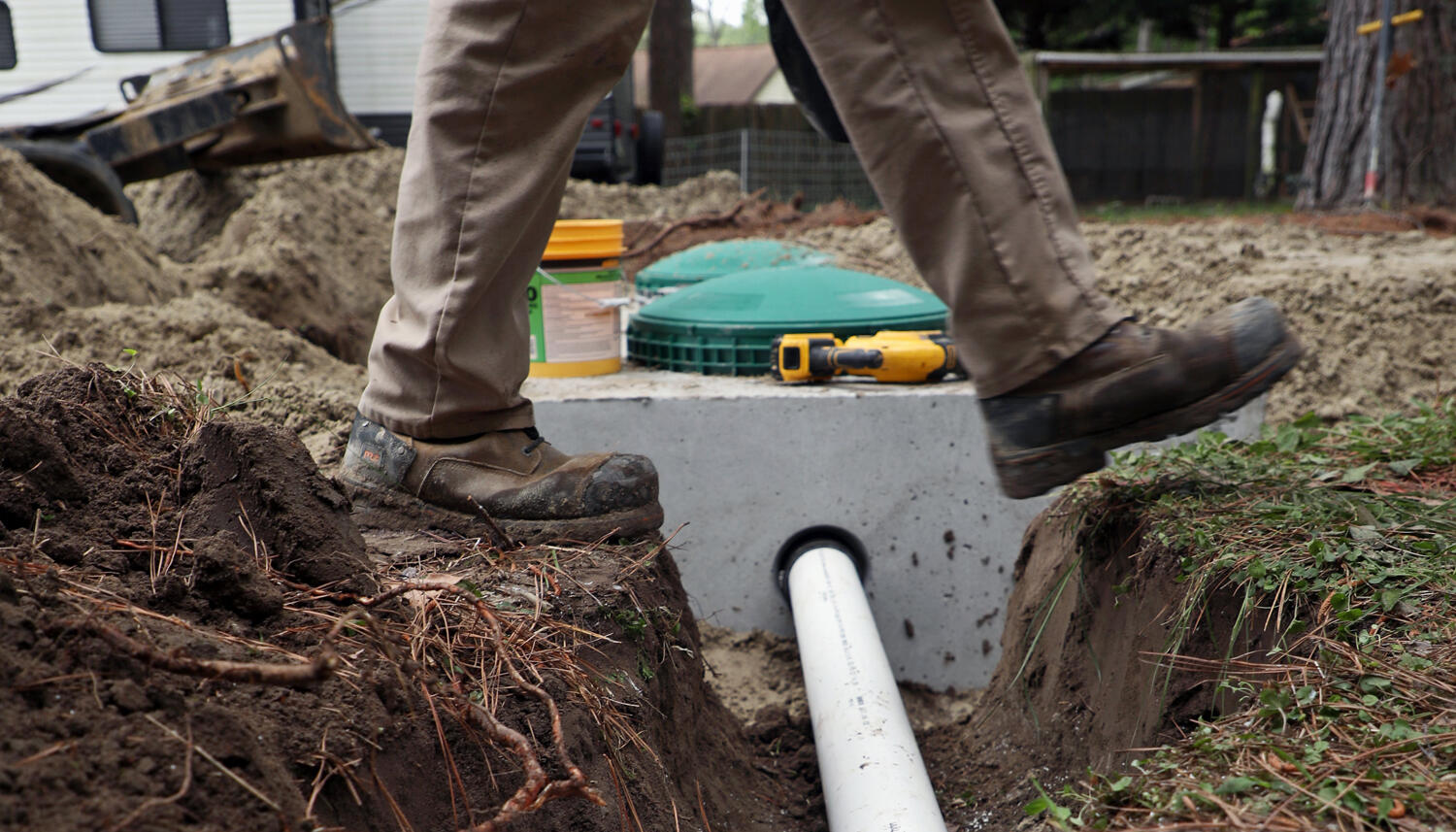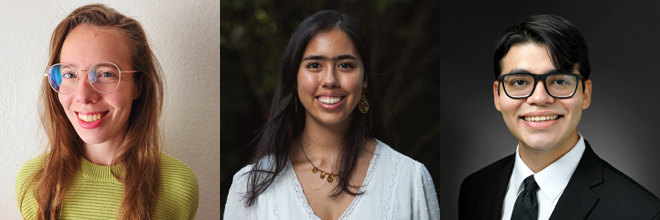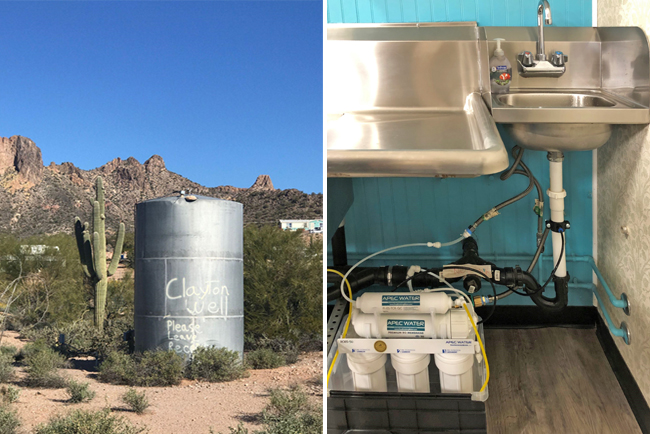
Graduate student researchers addressing decentralized water systems with National Science Foundation support
Water infrastructure systems can be generally classified as centralized or decentralized. In much of the US, residents rely on centralized systems - those where both water and wastewater services are provided to customers by a large, centralized network.
Decentralized systems are diverse and challenging to define. The people who rely on them include individuals and communities in rural areas using wells and septic systems, as well as urban and suburban residents with inadequate access. For example, decentralized systems serve a growing number of people experiencing water shutoffs or intermittent centralized water supplies, and people living in mobile homes, on reservations or in colonias. Research indicates there are over 16,000 individuals living with incomplete plumbing in Phoenix alone.
Three graduate students with the Arizona Water Innovation Initiative (AWII) – a program supported by the state and led by Arizona State University’s Julie Ann Wrigley Global Futures Laboratory in collaboration with the Ira A. Fulton Schools of Engineering – have received prestigious National Science Foundation Graduate Research Fellowships (NSF GRF) to work on decentralized systems. Their funding helps to leverage state support for AWII.
Each graduate researcher is addressing different aspects of decentralized water and wastewater systems in Arizona, particularly related to colonias, rural communities north of the US-Mexico border that often face water and wastewater infrastructure challenges.

Claire Cropper is a second year doctoral student in engineering working with AWII pillar lead Paul Westerhoff, Regents' Professor in the School of Sustainable Engineering and the Built Environment. Cropper hails from Alaska and spent several years as a licensed, practicing civil engineer working on decentralized systems, often in Alaska Native communities.
“Working with decentralized water and sewer systems gave me an appreciation for how unique and different they tend to be,” says Cropper. “I am passionate about engineering infrastructure in places that are not suburbs, not cities, including on reservations and in refugee camps.”
Anahi Yerman is a first year doctoral student working with Amber Wutich, AWII pillar lead and President's Professor and Director of the Center for Global Health in the School of Human Evolution and Social Change. Yerman recently finished a Master’s degree at the University of Utah.
“I worked with rural, traditional ranching communities in Baja California Sur, Mexico and noticed how important water is in the desert, obviously,” says Yerman. “It’s not something you think about if you can just turn on the tap. But in these communities, even hurricanes are seen as a net good because they bring desperately needed water.”
Dylan Diaz-Infante is a second year doctoral student, also working with Amber Wutich.
“I fell into this kind of work. As an undergraduate at the University of Texas, El Paso, I ended up working with a professor on a project analyzing utility price inequities in single parent households in El Paso County,” says Diaz-Infante. “I also helped conduct a technical document review of water projects along the entire US Mexico border from Texas to California. That led me to working with AWII.”
The NSF GRF program supports the student, not necessarily a specific project. Therefore, the graduate researchers are pursuing a range of projects.
“A big part of my research is looking at menstrual waste and its impact on the environment and people,” says Cropper. “Before we can really look at the impact, we have to figure out how it goes through engineered systems.”
In large centralized systems, a lot of menstrual waste gets diluted, but little is known about what happens in septic leach fields.
“There are not many female civil engineers, and there are especially not a lot of female civil engineers in wastewater,” says Cropper. “When I was in Alaska, I ended up being on my period during a trip to a village and realized these off grid wastewater systems we were designing didn't really take into account periods, which is a pretty big oversight.”
Yerman is also continuing a line of work started before coming to ASU.
“I received the NSF GRF during my first year of my Master's,” says Yerman. “I was originally looking at Latin American godparenthood and how communities use that and other fictive kinship systems as a strategy to mitigate poverty and resource disparities.”
Yerman says that kinship can be thought of as family, whether blood related or through marriage or adoption. Fictive kinship is something between family and friendship. Godparents are one example of a more formal fictive kinship relationship, “blood brothers” is a less formal type.
“I’m interested in broader theories of fictive kinship and kinship as a strategy for often marginal communities residing in resource scarce areas,” says Yerman. “I’m interested in how this relates to water in off-grid communities around Arizona and on reservations.”
Diaz-Infante studies what are known as moral economies for water, or what he loosely refers to as a grassroots approach to resource management.
“I am looking at moral economies for water and how they come into being,” says Diaz-Infante. “The kinds of tightly knit, interwoven social networks that can produce a mutually responsive and accountable structure of people who participate in water exchanges is critical.”
“These are scrappy, independent cultures that are used to roughing it and have in turn become very resilient,” Diaz-Infante continues. “I am curious how those resiliency-based relationships develop and if they can be created to support people in maintaining their water access.”

While the researchers each have their own projects, they are working together on various aspects of projects shared between the AWII Arizona Water for All and Global Center for Water Technology pillars focused on colonias.
For Cropper, that means learning about decentralized systems in a new context.
“I'm very familiar with what decentralized systems look like, particularly in Alaska. The Alaska Native communities I worked with are hunter gatherer oriented and homes tend to be clustered around a central area. That makes it easy because one building can have an open water pump that everyone hauls water from,” says Cropper. “With Arizona being more agrarian focused, people are spread out. Things that work in Alaska might not work as well here.”
The group of researchers agrees that there are some big challenges studying decentralized water and wastewater systems.
“I think it’s sad that people focus so much on centralized systems because the majority of the world is on decentralized systems,” says Yerman. “The work we’re doing here is local to Arizona and the arid west, but will also allow us to share lessons with other places with decentralized systems.”
“Household water provision is a phrase that is indicative of the general orientation toward centralized systems. For example, if you don't have a house, you don't have access to the water grid,” adds Diaz-Infante. “That means you don’t have a say in water decisions. You get fewer people making decisions about water and less knowledge about what kinds of treatment options exist. You also tend to get more people who fall through the cracks.”
Despite the challenges, the team is excited to be working on critical water issues in Arizona.
“I am excited to be learning with and working alongside the brilliant and wide reaching talent we have in our groups, including Anahi and Claire. We are super eager to get our feet on the ground,” says Diaz-Infante. “I also think it's reasonable to be a bit nervous. We have the honor and the privilege to work alongside these communities dealing with delicate issues. We want to set a good example for other researchers seeking to do meaningful, impactful, community driven work.”
Related stories: